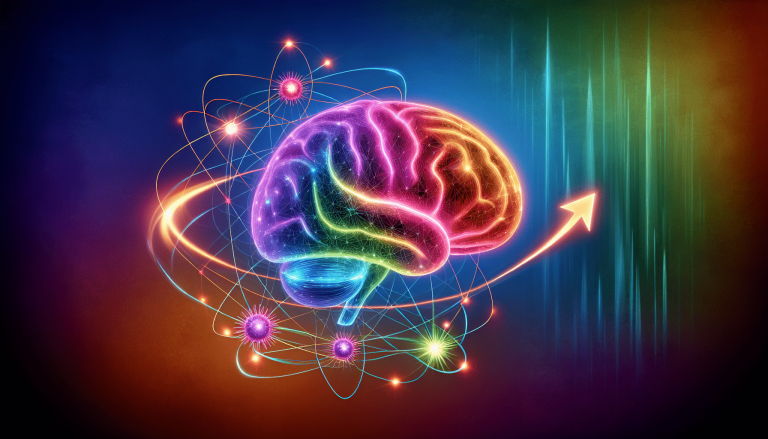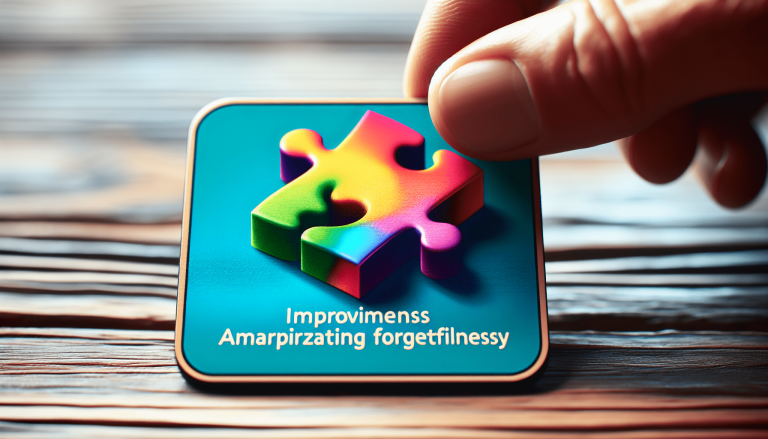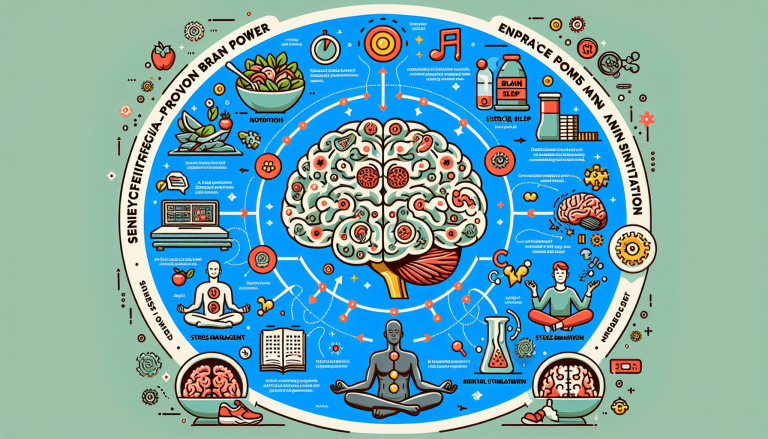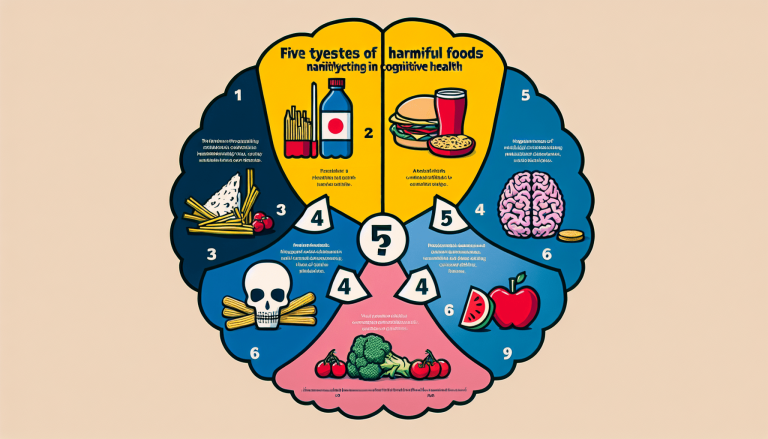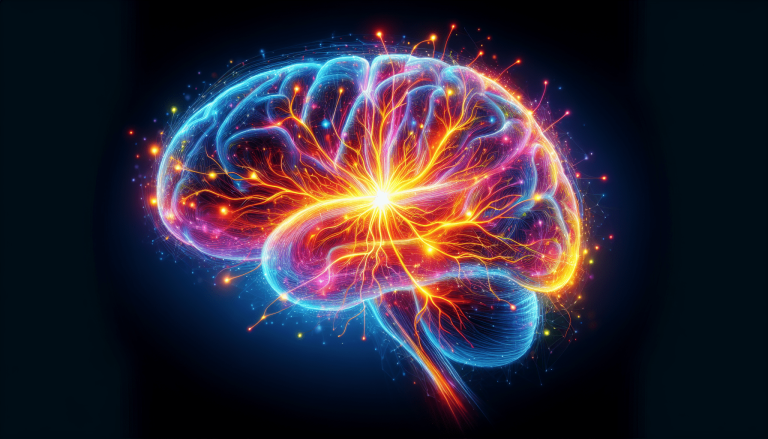What Activities Can Keep Your Brain Healthy?
In “What Activities Can Keep Your Brain Healthy?” you’ll discover a variety of engaging activities that can help maintain and even boost your brain health. From engaging in regular physical exercise to exploring creative hobbies and maintaining social connections, you’ll find practical tips that are both fun and beneficial for your mind. This article highlights how each activity contributes to cognitive function, offering you actionable steps to keep your brain in tip-top shape. Get ready to dive into a world of stimulating and enjoyable routines designed to sharpen your mental acuity and enhance your overall well-being.
Have you ever wondered what activities can keep your brain healthy? As you age, maintaining your cognitive health becomes increasingly important. Fortunately, there are plenty of activities that can help you keep your brain in top shape. From physical exercise to mental challenges, there’s a wide array of options to explore. Let’s dive into some of the best ways you can keep your brain healthy and vibrant!
Why is Brain Health Important?
Your brain is more than just an organ; it’s the control center of your entire body. For you to perform daily functions efficiently, you need a well-functioning brain. By keeping your brain healthy, you enhance your quality of life, improve memory, and even reduce the risk of neurological conditions like Alzheimer’s disease.
Cognitive Decline and Aging
As you grow older, cognitive decline becomes more evident. This doesn’t mean you are destined to lose your mental sharpness. Engaging in activities that stimulate your brain can help stave off cognitive decline.
The Role of Physical Exercise
Physical activity isn’t just good for your body; it has a multitude of benefits for your brain as well. You might wonder how exercise impacts brain health, and the answer lies in its ability to boost blood flow to the brain, releasing beneficial hormones, and facilitating neurogenesis.
Types of Exercise for Brain Health
Not all exercises are created equal when it comes to brain health. Here are some that have shown remarkable effectiveness:
| Type of Exercise | Benefits for Brain |
|---|---|
| Aerobic Exercise | Increases heart rate, which pumps more blood to the brain. Examples: jogging, swimming. |
| Strength Training | Improves cognitive function by enhancing circulation and reducing stress. Examples: weightlifting, resistance bands. |
| Yoga | Combines physical movement with mindfulness, lowering stress levels and improving mental clarity. |
| Dance | Enhances coordination and stimulates various brain regions, improving both physical and cognitive agility. |
How Much Exercise is Enough?
Experts recommend at least 150 minutes of moderate aerobic activity per week, supplemented by muscle-strengthening activities on two or more days a week. Consistency is key, so find a routine that works best for you.
Mental Stimulation: Feed Your Brain
Engaging in mentally stimulating activities can lead to improved brain function and reduced risk of cognitive decline. Mental stimulation works by forming new neural connections and strengthening existing ones.
Brain-Boosting Activities
Here are some activities proven to keep your mind sharp:
| Mental Activity | Benefits for Brain |
|---|---|
| Reading | Expands vocabulary, enhances knowledge, and improves focus. |
| Puzzles | Sharpens problem-solving skills and cognitive function. Examples: crosswords, Sudoku. |
| Learning New Skills | Encourages neuroplasticity and keeps neural pathways efficient. Examples: learning a new language, playing a musical instrument. |
| Games | Enhances strategic thinking and memory. Examples: chess, card games. |
| Writing | Improves cognitive processing and emotional regulation. Examples: journaling, creative writing. |
How Often Should You Engage in Mental Activities?
Aim to incorporate a variety of mentally stimulating activities into your daily routine. Even as little as 15-30 minutes a day can make a significant difference over time.
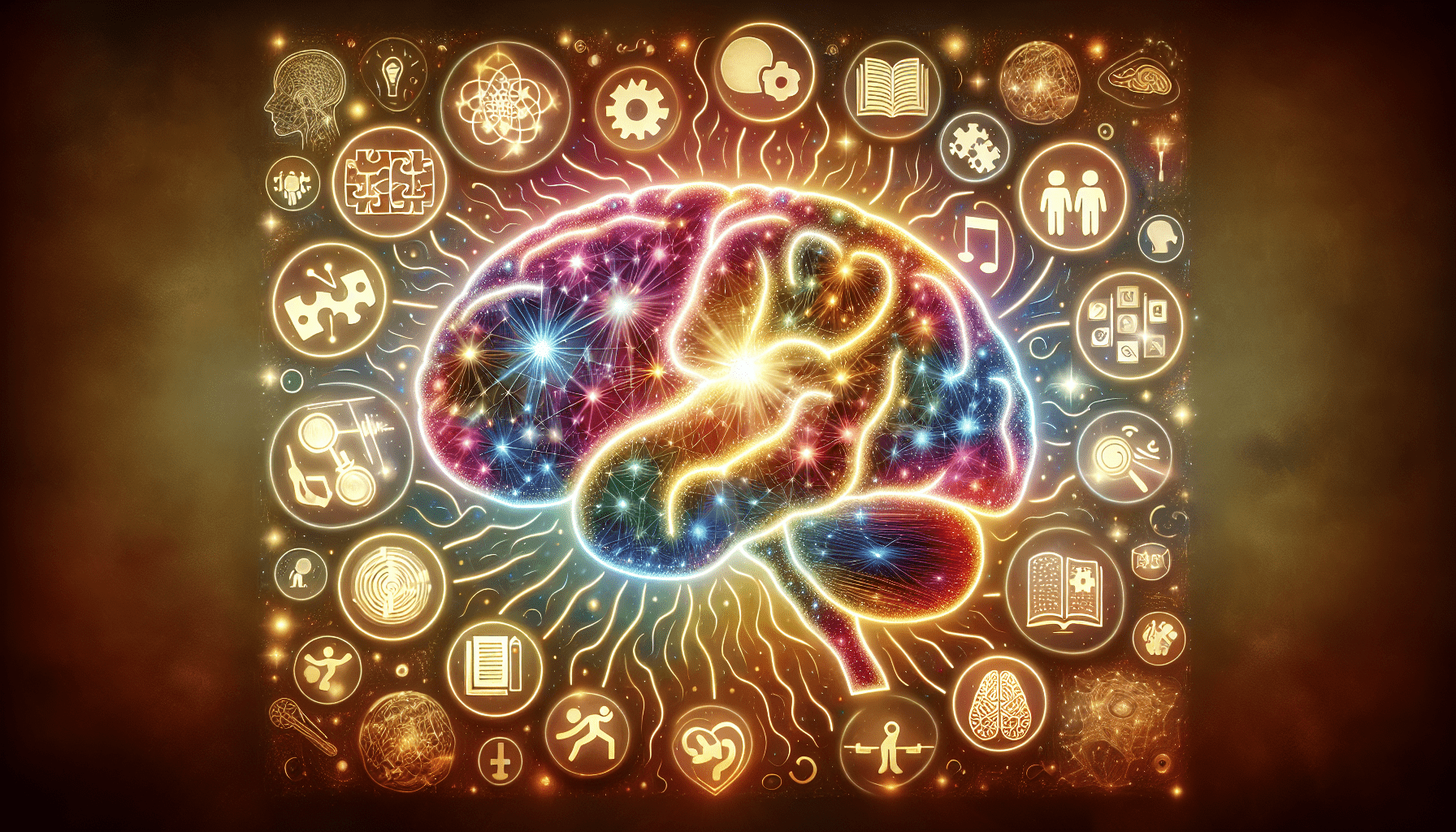
Nutrition for Brain Health
What you eat amazingly impacts your brain health. Nutrients from food fuel your brain and help in neurogenesis, synaptic plasticity, and overall cognitive function.
Brain-Healthy Foods
Incorporating the following foods into your diet can make a remarkable difference in brain health:
| Food | Benefits for Brain |
|---|---|
| Fatty Fish | Rich in Omega-3 fatty acids, which support memory and performance. Examples: salmon, trout. |
| Leafy Greens | High in antioxidants and vitamins that protect against cognitive decline. Examples: spinach, kale. |
| Berries | Packed with antioxidants that reduce inflammation and oxidative stress. Examples: blueberries, strawberries. |
| Nuts and Seeds | Loaded with nutrients that support brain function. Examples: walnuts, sunflower seeds. |
| Whole Grains | Improve blood flow to the brain and enhance memory. Examples: oats, barley. |
| Turmeric | Contains curcumin, which can cross the blood-brain barrier and has anti-inflammatory effects. |
| Dark Chocolate | Rich in flavonoids, caffeine, and antioxidants that boost brain health. |
Hydration is Key
Don’t overlook the importance of staying hydrated. Water helps maintain the brain’s fluid balance, which is crucial for cognitive functions and mood stabilization. Aim for at least 8 glasses of water a day.
Social Interaction: The Human Connection
Social interactions play a crucial role in keeping your brain sharp. Humans are social beings, and interactions can stimulate various cognitive processes, improve memory, and even enhance problem-solving skills.
Benefits of Social Engagement
Engaging in social activities offers a multitude of brain benefits:
| Social Activity | Benefits for Brain |
|---|---|
| Conversations | Stimulates cognitive functions and improves memory. |
| Group Activities | Enhances social bonds and reduces stress. Examples: book clubs, community service. |
| Volunteering | Provides a sense of purpose and mental engagement. |
| Family Time | Strengthens emotional connections and offers cognitive challenges. |
| Social Media (Moderately) | Offers mental engagement, but balance is essential to avoid stress. |
How to Stay Socially Engaged
Even in today’s busy world, you can find ways to stay socially active. Schedule regular meet-ups with friends and family, join clubs or organizations, volunteer in your community, or even partake in online forums and classes.
Sleep: The Unsung Hero of Brain Health
Sleep is often undervalued, but it’s one of the most crucial aspects of brain health. High-quality sleep is essential for memory consolidation, emotional regulation, and cognitive functions.
Impact of Poor Sleep
Lack of sleep can have detrimental effects on your brain, including:
- Memory Issues: Sleep is crucial for processing and storing daily information.
- Mood Swings: Poor sleep can directly affect your emotional stability.
- Impaired Cognitive Function: Decision-making, focus, and creativity can all suffer.
How to Improve Sleep Quality
Here are some tips to ensure you get adequate and high-quality sleep:
| Sleep Tip | Explanation |
|---|---|
| Consistent Schedule | Go to bed and wake up at the same time every day. |
| Limit Screen Time | Reduce exposure to screens at least an hour before bedtime. |
| Comfortable Sleep Environment | Keep your room cool, dark, and quiet. |
| Mindfulness and Relaxation | Engage in calming activities like reading or meditation before sleep. |
| Limit Caffeine and Alcohol | Avoid these stimulants, especially in the evening. |
Aim for 7-9 hours of quality sleep each night to keep your brain functioning optimally.
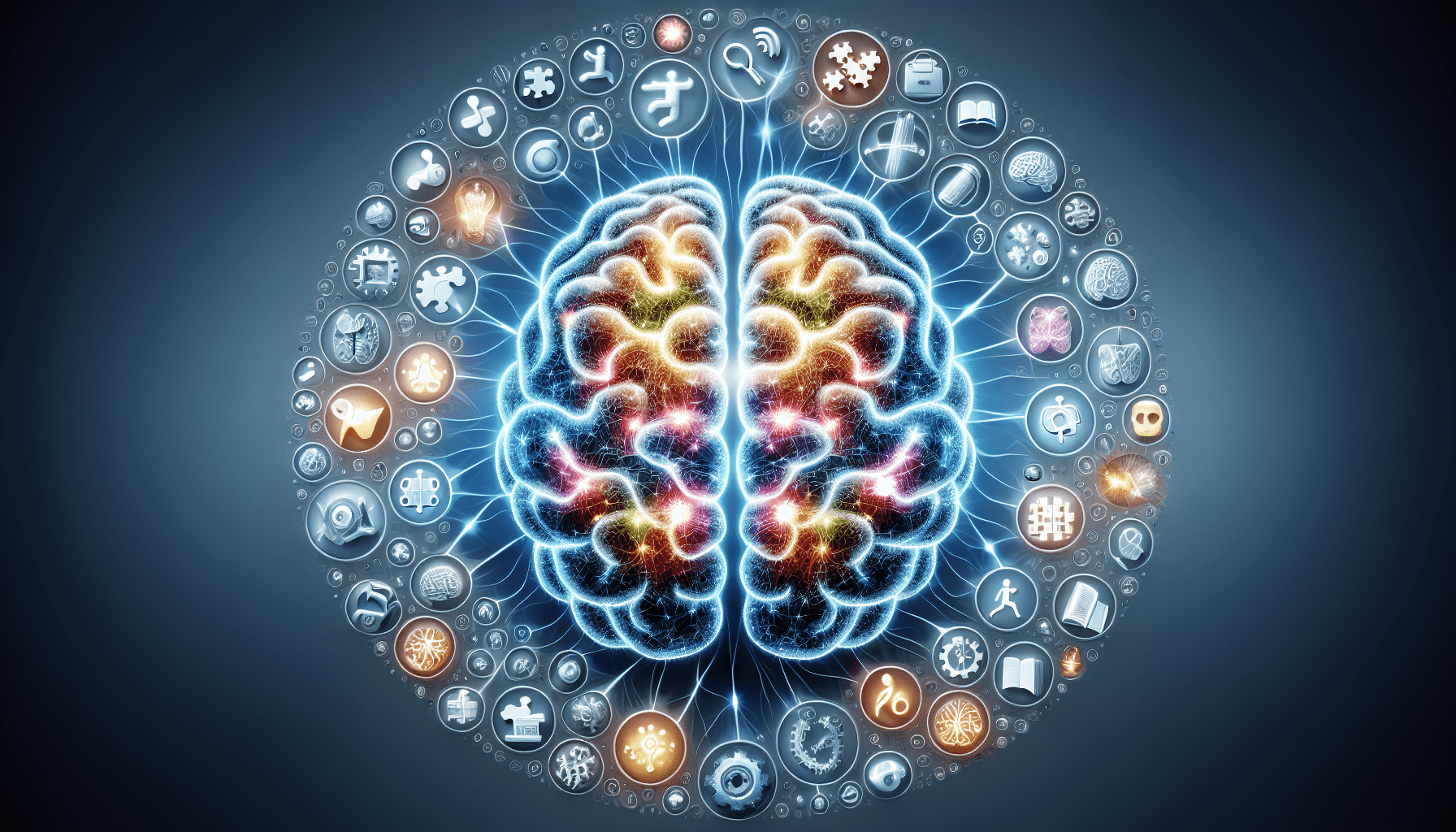
Mindfulness and Meditation
These practices go beyond stress reduction; they also have a profound impact on brain health. Mindfulness and meditation can alter brain structure and function, leading to improved emotional regulation, focus, and overall mental well-being.
Benefits of Mindfulness and Meditation
Both practices offer an array of cognitive benefits:
| Benefit | Explanation |
|---|---|
| Reduced Stress | Lowers cortisol levels, which has a positive impact on brain health. |
| Improved Focus | Enhances your ability to concentrate and maintain attention. |
| Emotional Regulation | Helps in managing emotions, reducing anxiety, and improving mood. |
| Neuroplasticity | Promotes the growth of new neural connections, improving cognitive functions. |
How to Get Started
If you’re new to these practices, start simple:
- Find a Quiet Space: Ensure you won’t be interrupted.
- Choose a Comfortable Position: Sitting or lying down works fine.
- Focus on Your Breath: Pay attention to each inhale and exhale.
- Start Small: Begin with 5-10 minutes and gradually increase the time.
Many mobile apps offer guided meditations to help you get started.
Lifelong Learning: Never Stop Growing
Lifelong learning has a significant positive impact on brain health. Continually challenging your brain helps keep it sharp and fosters new neural connections.
Benefits of Lifelong Learning
Engaging in continuous learning offers many advantages:
| Benefit | Explanation |
|---|---|
| Neuroplasticity | Enhances the brain’s ability to reorganize itself. |
| Improved Memory | Strengthens neural connections, boosting memory. |
| Increased Confidence | Enhances self-esteem and mental well-being. |
| Adaptability | Prepares the brain to be flexible and adaptive to new information. |
How to Pursue Lifelong Learning
There are numerous ways to continue learning throughout your life:
- Online Courses: Platforms like Coursera or Udemy offer a wide range of subjects.
- Workshops and Seminars: Attend events that pique your interest.
- Join Study Groups: Collaborate with others to enhance learning.
- Reading: Engage with both fiction and non-fiction books.
- Hobbies: Explore new activities that challenge your skills, such as painting or woodworking.
Stress Management: Reduce and Manage Stress
Chronic stress has adverse effects on both your physical and mental health. Managing stress is critical for maintaining brain health, as prolonged stress can impair cognitive functions and emotional balance.
Strategies for Stress Management
Incorporate these stress-relief strategies into your routine:
| Strategy | Description |
|---|---|
| Mindfulness Practices | Engage in activities that promote mindfulness, such as yoga or tai chi. |
| Physical Activity | Exercise helps reduce cortisol levels and enhances mood. |
| Social Support | Talk with friends, family, or a therapist to unload stress. |
| Hobbies | Engage in activities that you enjoy and that help you relax. |
| Time Management | Prioritize tasks and delegate when possible. |
Regularly engaging in these practices can make a big difference in how you manage stress, thereby benefiting your brain.
Environmental Factors: Optimize Your Surroundings
The environment you surround yourself with has a substantial impact on your mental health and cognitive function.
Creating a Brain-Healthy Environment
You can make small but significant changes to optimize your surroundings for better brain health:
| Change | Impact |
|---|---|
| Declutter | A tidy space can improve focus and reduce stress. |
| Nature | Spend time outdoors or introduce plants into your living space to reduce anxiety and improve mood. |
| Lighting | Natural light supports circadian rhythms and enhances well-being. |
| Noise Levels | Reduce noise pollution to improve concentration and reduce stress. |
| Ergonomics | Ensure your workstation is ergonomically designed to reduce physical strain and mental fatigue. |
These adjustments can create a more conducive environment for maintaining mental well-being.
The Power of Positive Thinking
Your mindset plays a critical role in brain health. Adopting a positive outlook can bolster cognitive function and emotional resilience.
Benefits of Positive Thinking
Practicing positive thoughts encourages a variety of brain-boosting effects:
| Benefit | Explanation |
|---|---|
| Reduced Stress | Lowers the production of stress hormones. |
| Enhanced Resilience | Improves the brain’s ability to cope with adversity. |
| Better Mental Health | Reduces the risk of depression and anxiety. |
| Improved Performance | Enhances cognitive function and problem-solving skills. |
How to Cultivate Positive Thinking
Incorporate these practices to foster a positive mindset:
- Gratitude Journal: Write down things you’re thankful for each day.
- Affirmations: Use positive affirmations to shift your mindset.
- Mindfulness Meditation: Focus on the present to reduce negative thoughts.
- Surround Yourself with Positivity: Engage with uplifting content and people.
Cognitive Behavioral Therapy (CBT)
If you find it challenging to maintain a positive outlook or manage stress, Cognitive Behavioral Therapy (CBT) can be an effective tool. CBT helps you identify and change negative thought patterns, improving mental health and brain function.
How CBT Works
CBT involves:
| Step | Description |
|---|---|
| Assessment | Identifying negative thought patterns. |
| Intervention | Learning techniques to change those thoughts. |
| Practice | Applying these techniques in daily life. |
| Evaluation | Regularly assessing progress and adjusting strategies. |
CBT can be practiced with a therapist or through self-help resources.
Conclusion: Take Action Today!
Maintaining brain health is a multifaceted endeavor that involves physical exercise, mental stimulation, a balanced diet, social interactions, quality sleep, stress management, and a positive environment. By engaging in these activities, you can significantly enhance your cognitive functions, emotional well-being, and overall quality of life. Don’t wait to start integrating these practices into your daily routine. Your brain will thank you for it!
Would you like to make any of these changes in your life? Start today, and you’ll be amazed at the positive impact on your brain health.
Additional Resources
This is absolutely insane!
This video explains how brilliant scientists managed to revoke Alzheimer, dementia and 3 other types of brain diseases in 100% of cases. It was the biggest trial ever run on 7,000 people, from mild to severe memory loss disease. You can check their findings here
It took them 4 years and a lot of sweat and blood but in the end they actually discovered the real root cause of brain damage and why diseases like Alzheimer and dementia happen to millions these days.
See this incredible discovery here.
Now there’s something else they found, something completely unexpected. By neurostimulating certain areas of the brain, they actually found the source for tinnitus and hearing loss.
You simply cannot afford to miss these files as long as they are up.


